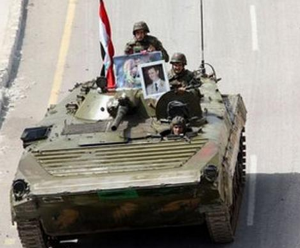By Jay R.
The minimal support provided to Syrian revolutionaries from abroad will only amount to a longer, bloodier conflict.
The Syrian uprising began nine months ago, when in March, thousands of pro-reform demonstrators took to the streets in Deraa to denounce the Assad regime. Since that time, thousands of civilians have been killed and the country has arguably declined into civil war.

Just a month before the streets of Deraa erupted, the world’s attention was on Benghazi. Libyans had also taken to the streets in similar fashion, who were likewise met with live ammunition by Ghaddafi’s forces. The events in Benghazi escalated to civil war in their own right; however the end of hostilities there has already arrived.
The primary reason for the end of Libyan hostilities was the overwhelming support that opposition forces received from the international community. It only took two weeks from the time the Libyan people demanded change in their country for the world to begin its assistance, when it froze Gaddafi’s and his inner circle’s assets, limited their travel, and referred the lot to the International Criminal Court. In just the following month, the United Nations approved a resolution to enforce a no-fly-zone, which included using “all necessary measures” to thwart attacks on the citizenry. The aforesaid resolution subsequently led to a new Libyan government, which was recognized by the United Nations, in just seven month’s time.
Meanwhile, across the Mediterranean, the Syrian uprising is entering its nine month and the disparity between the two revolutions is vast. Assad is still in power, and his efforts to quell the revolution in his country persist as unabated as scores of people are being killed every day. However, it must be noted that the Syrian opposition, as did the Libyan counterpart, formed its own National Council of rebel organizations. They likewise have begun to encourage defections from the military and have shown the capacity to carry out sophisticated attacks against regime forces. But, where is the international community? Where is the no-fly-zone? Where is the overabundance of Western air support, which comes along with Arab League backing?
The world’s inaction is due to a variety of reasons. First of which, is likely the lack of appetite for another infiltration, especially in a country like Syria, which enjoys both financial and military support from Iran, while maintaining significant trade relations with two United Nations Security Council members – Russia and China, who have acted as a stumbling block towards the enforcement of any meaningful sanctions for a significant amount of time. Furthermore, Syria is one of the Arab League’s founding members. It may be for this reason that the regional body took its time building consensus for the modicum of action it has thus far taken. While finally, Bashar al-Assad has not been on the radar of the West for decades, like Col. Gaddafi, and therefore, they were not so opportunistic as to seize the opening for his ouster when it presented itself.
As a result, we will see the Syrian revolution play out much differently and it will likely be a continuation of the actions we have seen thus far. There will be increased draconian rhetoric from nations like the United States and Turkey who are looking to assert their influence in the region at this critical moment. These two nations will likely continue their efforts to provide minimal support to opposition activity; however, it will prove to be futile in the short-term. If there is to be real change in the coming weeks, it must come from the Arab League, who has notably suspended its founding member from its ranks. Nevertheless, it will need to go further, by overtly giving the green light to the international community to intervene. The body is currently mulling referring the situation to the Security Council in the coming days, and therefore, there may be hope left – perhaps in time for the uprising’s one year anniversary.
Read more here about Max Security’s Intelligence Department.